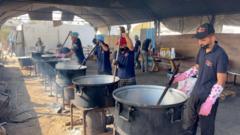As the humanitarian blockade in Gaza persists, the health crisis intensifies for the two million residents affected. With lack of medical supplies causing treatable conditions to escalate, humanitarian organizations and European officials criticize Israel's actions as a violation of international laws, while the Israeli government defends its position until hostages are released.
Humanitarian Crisis in Gaza Deepens as Blockade Continues

Humanitarian Crisis in Gaza Deepens as Blockade Continues
The ongoing siege imposed by Israel on Gaza is leading to dire shortages of food, water, and medicine, resulting in rising illness and mortality rates among the civilian population.
The humanitarian conditions in Gaza have reached catastrophic levels, exacerbated by Israel's ongoing total blockade that has now lasted over two months. The blockade prevents all humanitarian aid — including essential supplies such as food, fuel, and medicine — from entering the region, leaving the approximately two million residents in dire straits.
Muneer Alboursh, director general of Gaza’s health ministry, conveys the urgency of the situation as he receives desperate calls from medical professionals seeking medications to treat patients with critical health issues such as heart problems and kidney failure. With no supplies available, individuals are left to plead for alternatives, often with fatal consequences. Alboursh candidly states, "There’s no advice I can give them. In most cases, those patients die."
Israel insists that the blockade is a lawful measure aimed at pressuring Hamas to release hostages, following a two-month cease-fire that recently collapsed. The Israeli government argues that Gaza's existing provisions are sufficient to meet the needs of the population. However, humanitarian organizations and officials from Europe vehemently denounce these assertions, claiming that Israel is using humanitarian aid as a strategic tool in its conflict and that the total blockade infringes upon international humanitarian law.
Compounding the misery of the civilians, the siege impacts nearly every aspect of daily life. This crisis is not novel; the strip has suffered restrictions for nearly two decades, following Hamas's takeover in 2007, supported by Israel's and Egypt's measures. The severity of the current blockade has led many residents to rely on charity food kitchens for sustenance, with the threat of starvation looming larger by the day.
With tensions escalating and humanitarian calls for relief falling on deaf ears, the plight of Gazans leads to growing international concern, questioning the legality and morality of the ongoing blockade imposed by Israel.



















